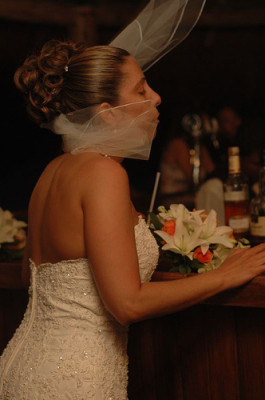
source: blmurch
Should you have an open bar at your wedding? This seems to be one of the most hotly debated topics for brides, wedding planners, and caterers alike. Some feel that an open bar at a wedding is a must and forcing your guests to pay for drinks shows a lack of courtesy. Others disagree just as strongly saying it shouldn’t be incumbent on the bride and groom to pay for their friends and family to drink on their dime.
In the end, there’s no right answer. Every situation is unique. But, it’s important to understanding your options so you can feel comfortable with your decision.
How much does an Open Bar for a Wedding Cost?
The largest cause of stress over an open bar is the cost. For large wedding parties, the cost to the bride and groom of footing the entire bar bill can get pricey. There are two major factors influence the cost of an open bar at a wedding and you can plan based on how they fit into your budget.
Who’s Buying?
The first thing to consider about an open bar at a wedding is who you’re purchasing the open bar from. This is an especially important consideration when you’re choosing a venue. While some venues maintain exclusive rights to manage the catering and bar, others will allow you to bring a bartender and alcohol in yourself.
This can be a much more economical option for hosting an open bar at a wedding. By buying all the alcohol and mixers yourself and hiring a bartender to serve it, you’ll be paying wholesale prices on liquor, mixers, beer, and wine instead of retail prices. If you buy from a wholesaler that accepts returns, you can return any alcohol that doesn’t get consumed.
Local liquor laws can play a role here, so talk to your venue, wedding planner and/or caterer to make sure everything is on the straight and narrow.
If your venue requires you to use their bar service, there will likely be two different options:
Open Bar vs. Hosted bar

Image source: julie_chen
From the perspective of the guest, these two options are the same. From the perspective of the host, they are entirely different.
In this case, we’re defining an open bar as charging per person, per hour.
A hosted bar means each drink is rung up when it’s served and the final bill is passed on to the host. Most venues, caterers or bartending services will give you the option of choosing between the two.
If you feel your guests are going to be heavy drinkers, you’ll be better off opting for an open bar so you don’t risk them running up the bill at a hosted bar. An open bar is nice for budgeting a wedding since it gives you a definite number that you’ll be spending instead of forcing you to estimate as you would with a host bar.
If your guests are light drinkers, a hosted bar is a better choice since you won’t be overpaying for a party that is going to stay rather mild anyway.
What about a Limited Bar?
If you don’t like either of those options, a limited bar can be a good way to find a happy middle ground between an open bar and a cash bar.
Wine and Beer Only
One option is to limit the choices available to your guests at an open bar to wine and beer. Since liquor is the main driver of costs because it’s the most expensive and also the most quickly consumed, by eliminating that you can usually negotiate a much lower price on your open bar at the wedding reception.
Another popular option is to offer an open bar with wine and beer and then have liquor drinks be available if your guests want to pay cash. This leaves an option for those who want liquor, but doesn’t leave you footing the bill for it.
Wine, Beer, and a Specialty Drink
Having a specialty drink lets you offer something other than just wine or beer, without having a full bar. A specialty drink can also be a cool, unique way to feature something at your wedding that includes a story about the bride and groom. If, for example, the couple are avid horse riders, you could include mint juleps because of their fame at the Kentucky Derby.
Hosted or Open Bar with a Limit
If you want a full open bar, but aren’t comfortable with it for budget or for personal reasons don’t want it going on too long, you can choose to offer an open bar up to a set point and then have it revert to a cash bar.
You could for example set a $2000 limit on your hosted bar and once it passes that amount, guests would be responsible for buying their own drinks. This lets you offer your guests a few drinks, but if they want to really indulge, they can foot the bill themselves.
You could do the same with an open bar and limit it by time. Leave the bar open for the first few hours of the reception and then allow people to pay cash at the end of the night if they choose to continue consuming.
More Useful Resources:
Wedding Planning: Open Bar vs. Cash Bar
Portable Bars for Weddings
[leadplayer_vid id=”52DC1A5269CDF”]